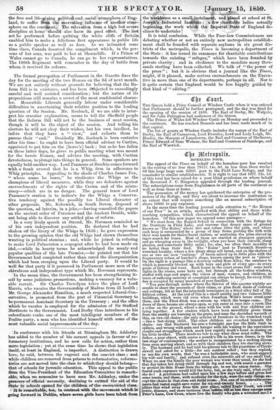The formal prorogation of Parliament in the Gazette fixes the
day for the meeting of the two Houses on the 3d of next month. We are not entirely without grounds for believing that the Re- form Bill is in existence, and has been Abjected to exceedingly careful and well assisted consideration ; but the nature of its propositions still remains a secret of the most confidential charac- ter. Meanwhile Liberals generally labour under considerable difficulties in ascertaining their relative position to the leading question of the Session. Mr. Roebuck, if we are able to inter- pret his oracular explanation, seems to tell the Sheffield people that the Reform Bill will not be the business of next session, though it will be the object of the session. And telling his electors he will not obey their wishes, but his own intellect, he infers that they have a " view," and exhorts them to pursue their "end." Decidedly Mr. Roebuck is born centuries after his time : he ought to have been official adviser to Curtius, appointed to pat him on the [horse's] back ; but as he has fallen on these latter days, he gives to public meeting what was meant for the heroic Roman, and advises the meeting, with Curtian devotedness, to plunge into things in general. Some speakers are equally bold another way. Lord Panmure at Brechin comes forward with a frank avowal that he is a Whig, firm in adherence to Whig principles. Appealing to the shade of Charles James Fox, " whose name he bears," he vindicates the Whigs as the champions of liberal measures, while they are defenders against encroachments of the rights of the Crown and of the aristo- craey--whieh are in no danger. The general tenor of Lord Panmure's oration is to indictee for the Whigs a Conserva- tive tendency against the possibly too Liberal character of other proposals. Mr. Kekewich, in South Devon, disposed of the question, ad interim, in a joke,—having consulted the papers 9n the ancient order of Foresters and the Ancient Druids, with- out being able to discover any settled plan of reform.
In a very lively speech at Stroud, Mr. Horsman reminded us of his own independent position. He declared that he had shaken off the livery of the Whigs in 1856; he gave expression to the growing opinion that the old Whigs had shown themselves wanting in political stamina ; and, while he joined in refining to make Lord Palmerston a scapegoat after he had been made an idol,—while in hearty terms he acknowledged the manly and popular qualities of the late Premier,—he pointed out that his Government had completed rather than cured the disorganization which had been creeping upon the Liberal party. It would be well for that party if it possessed in Parliament more men of the chivalrous and independent type which Mr. Horsman represents.
In the mean time, the Government has been strengthening it- self by some judicious promotions, making a vacancy for a valu- able recruit. Sir Charles Trevelyax takes the place of Lord Harris, who vacates the Governorship of Madras from ill health ; Mr. George Alexander Hamilton, a much respected Liberal-Con- servative, is promoted from the post of Financial Secretary to he permanent Assistant Secretary in. the Treasury ; and the office -which he vacates is employed for the admission of Sir Stafford Northeote to the Government. Lord Derby thus introduces to his subordinate ranks one of the most intelligent members of the Peelite party, a man who has identified himself with some of the most valuable social improvements of the day.


























 Previous page
Previous page